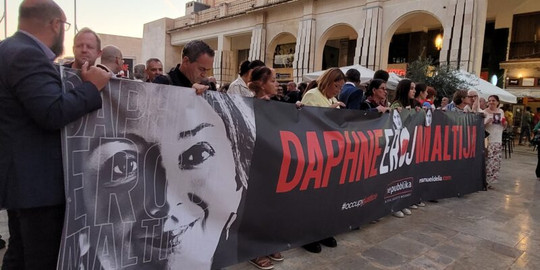Five years after the assassination of Daphne Caruana Galizia in Bidnija the European Parliament has paid tribute to the journalist and looked into the rule of law, organised crime, and corruption in Malta.
In its resolution adopted with 564 votes in favour, 10 against (the four Maltese MEPs from the socialist group and six MEPs from the German far-right party AfD), and 17 abstentions on 20 October, the European Parliament has acknowledged progress made in ongoing judicial proceedings, and the Maltese Prime Minister’s public apology for the state’s shortcomings that could have contributed to the Daphne Caruana Galizia murder. However, MEPs have regretted that investigations led to only three convictions in relation to the killing. They have insisted that everyone involved, at every level, needed to be brought to justice and have called on“the full and continuous involvement of Europol”.
MEPs are concerned that, one year after its publication, the implementation of the recommendations in the final report of a public inquiry into the killing is deficient, despite a number of reforms put forward by the government. They pointed at the lack of progress in prosecuting the high-level corruption and money laundering that Daphne Caruana Galizia had been investigating, and were alarmed by the “institutional failure of law enforcement and justice”, including recent revelations of repeated inaction on European Arrest Warrants.
The Parliament has voiced an array of further concerns, including:
- the length and inefficiency of investigative and judicial proceedings;
- allegations of money laundering and corruption;
- the relatively low number of cases referred to the European Public Prosecutor’s Office (EPPO) and the reported lack of cooperation from Maltese authorities;
- the impunity afforded to the former Prime Minister, his chief of staff, and the former minister for tourism; and obstacles to media freedom and pluralism.
MEPs have welcomed the additional resources to support investigations and prosecutions, reforms to the appointment procedure for judges and to the Attorney General’s office and role, several government proposals to improve media freedom (which would need, however, to ensure that relevant European and international standards are met), and the amendment of Malta’s Protection of the Whistleblower Act.
The European Parliament has also condemned the criminalisation of, attacks on, and killings of journalists, including those of Ján Kuciak and his fiancée Martina Kušnírová in 2018, of Viktoria Marinova also in 2018, and of George Karaivaz and Peter R. de Vries in 2021.
The IFJ and EFJ recall that 15 journalists have been killed in the EU since 2015 (in Denmark, France, Greece, Malta, The Netherlands, Poland, Slovakia and the UK).

